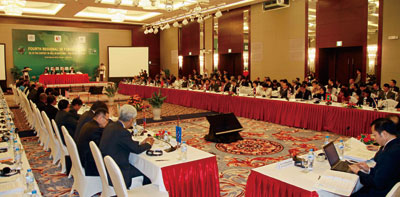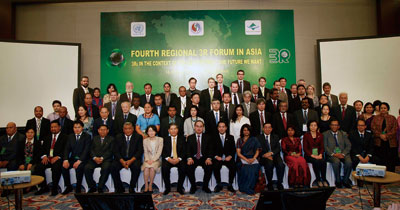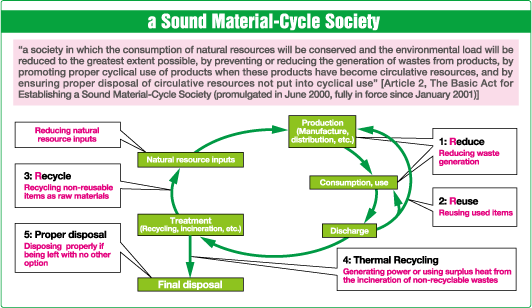Feature
3R - Efforts towards Establishing a Sound Material-Cycle Society
The 3Rs stands for "Reduce" , "Reuse" , and "Recycle".
"Reduce" is to decrease the generation of waste by using materials efficiently and wisely.
"Reuse" is to use the same items repeatedly as long as they are usable.
"Recycle" , refers to material recycling, is to use of non-reusable items as raw materials.
And if material recycling is not feasible, thermal recycling will be undertaken as much as possible.
Eventually, proper disposal is required if it has been left with no other option.

In order to reduce the environmental load to the extent possible, it is effective to put importance on Reduce first, then Reuse, followed by Recycle, thermal recycling, and proper disposal in this order. This priority order is supposed to be a basic principle; but it is not necessarily applied in case the latter way in this order reduces the environmental load more effectively.
Today we have built a society where economic and social activities based on mass-production and mass- consumption generate a great deal of waste, which damages environmental conservation and sound material cycles. This is closely related to various environmental issues including climate change caused by greenhouse gas emissions, the depletion of natural resources, and environmental destruction due to large-scale resource extraction. The Japanese government has, therefore, formulated the Fundamental Plan for Establishing a Sound Material-Cycle Society in accordance with the Basic Act for Establishing a Sound Material-Cycle Society (formulated in 2000), promoting necessary measures in a comprehensive and strategic manner, with a view to establishing a "sound material-cycle society" in which the consumption of natural resources will be conserved and the environmental load will be reduced to the greatest extent possible. Consequently significant reduction has been achieved in the volume of final disposal, thanks to efforts to promote the 3Rs, development of the legal framework (including individual Recycling Acts) and its relevant measures, as well as public awareness. Recently, the Third Fundamental Plan for Establishing a Sound Material-Cycle Society was approved by the Cabinet on 31 May 2013. The Third Plan does not only advance the existing measures focusing on the volume of waste such as decrease in final disposal amount, but also pay attention to the quality of material cycles, setting up the following new policy pillars: (i) reinforcement of efforts for Reduce and Reuse, which have far less progressed as compared to those for Recycle, (ii) recovery of useful metals, (iii) enhancement of efforts to ensure safety and security, and (iv) promotion of international cooperation in the field of 3Rs.
While promoting the aforementioned innovative measures domestically, Japan has made significant contribution towards establishment of a sound material- cycle society internationally. At the G-8 Summit held at Sea Island, the United States, in June 2004, Japan made a proposal for launching the "3R Initiative" to promote the 3Rs internationally, which was agreed by the G-8 leaders. Since then efforts for the 3Rs have been made worldwide, for example, the "Kobe 3R Action Plan" agreed at the G8 Environment Ministers Meeting in Kobe in May 2008 and the OECD's report "Resource Productivity in the G8 and the OECD" published in May 2011 with specific reference to the Kobe 3R Action Plan.

Proposed by Japan, "the Regional 3R Forum in Asia" was established in 2009. This forum serves as a basis for promoting partnership by multiple stakeholders such as national governments, international organizations, and donor agencies towards establishing a sound material- cycle society by appropriate waste management and 3R promotion in Asian developing countries, facilitating high-level policy dialogues through regular intergovernmental meetings and the support provided by international organizations to implement 3R projects in each country. While the second meeting was held in Malaysia in 2010, the third in Singapore in 2011 respectively, the fourth meeting in Ha Noi, Vietnam, in March 2013, adopted the "Ha Noi 3R Declaration - Sustainable 3R Goals for Asia and the Pacific for 2013-2023". The fifth meeting will be held in Indonesia in 2014.
Moreover, we have worked on bilateral cooperation on the 3Rs with Asian countries: for instance, eco-town cooperation with China, development of a national strategic plan for food waste management in Malaysia, and development of a national program on the 3Rs in Viet Nam.
Japan continuously strives to promote the 3Rs nationally and internationally, actively contributing to establishing a sound material-cycle society.


